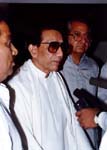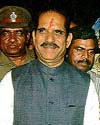
Commentary/Dilip D'Souza
Cases? What Cases? Riots? What Riots?
 I know some of you out there are students and I hope you are still learning
things. Because if you are, you will recognise the thrill I felt this week
-- the joy of learning new stuff, you know? I have found out so much over
the last few days. I feel especially privileged, because it all came from
two eminent men indeed: one was a chief minister, one is a chief minister.
I know some of you out there are students and I hope you are still learning
things. Because if you are, you will recognise the thrill I felt this week
-- the joy of learning new stuff, you know? I have found out so much over
the last few days. I feel especially privileged, because it all came from
two eminent men indeed: one was a chief minister, one is a chief minister.
This redoubtable pair, Manohar Joshi and Sudhakar Naik, appeared before the
Srikrishna Commission in Bombay this week, and what a good thing they did!
For had they not, I would have been floundering in ignorance about so many
issues. At least, I would have believed all kinds of nonsense about them.
How good of these two to take the time to set those impressions right.
For example, the government of Maharashtra has withdrawn various cases
against Bal Thackeray for his writings during the riots. In my naive,
foolish way, I had been thinking that there was one very simple -- or so it
appeared to me -- reason for this: that Thackeray is himself, for all
purposes we might think of, the government of Maharashtra. What good would
it do for the government to pursue cases against himself? Good reasoning,
no?
No. And it took Chief Minister Joshi to explain why. The real reason those
cases were withdrawn, Joshi told the Srikrishna Commission, was that "the
government was of the view that continuation of prosecution... would amount
to reopening of old wounds which had almost healed."
Whose wounds, Mr Joshi did not say. But the week's re-education only began
with that. The chief minister also brought up the famous "appeasement" of
Muslims that has led to so much resentment among Hindus. The nasty Congress
and the shifty Left parties, they have spent the years since Independence
pandering to and appeasing Muslims, and that's brought us to where we are
today, wherever that is. And what examples of such appeasement did Mr Joshi
offer up? "The lack of any effort on the part of the government to educate
Muslims and ensuring that they remained impoverished."
Of course. You keep a whole section of the population poor and illiterate,
you're "appeasing" them. Come to Maharashtra, fantasy land for the world.
Then there was Sudhakar Nero, the man who will forever be remembered,
though not with gratitude, for smoking his pipe while Bombay burned and the
rest of us feared for our lives. He too covered himself with glory at the
Commission. Seeing that he was only the chief minister of the state at the
time, might he have known that Thackeray had been publishing inflammatory
articles during the riots? No, "Nothing done by Mr Thackeray during the
riot period was brought to my notice." And in fact Thackeray "played no
part whatsoever in fermenting the riots." What about these press reports, in
one of which Naik claimed the Shiv Sena had started the riots, in
the second of which he issued a "plea" to Thackeray? Oh, pay no attention
to those, both were false.
So how did the riots start anyway? Well, there were the arrests of such
thugs-cum-politicians as Pappu Kalani and Hitendra Thakur. There were the
demolitions of structures (in Bombay, not Ayodhya). These things "may",
said Nero thoughtfully, suddenly have sent Bombayites into the frenzy we
saw, killing thousands of other Bombayites. And how come the mayhem was not
stopped? Oh, but if only the Army had acted, if only those officers and
jawans had done their duty as the city police and he, Nero, himself were so
conscientiously doing, as he begged them to do -- if only that had
happened, the riots would have been nipped in the bud. Instead, the rest of
us got kicked in the butt.
That's the kind of week it's been.
We should be grateful the week happened now, in 1997. If it had been, say,
a year from today that these men showed up to be questioned, I am fully
confident that they would have asked: "Riots? What riots?" Because that's
the only logical -- if I may be permitted as laughable a term as that one
-- end to the inverted, upside-down, merry-go-round that facts and events
must cope with in times like these.
Take just this business of Thackeray's literary ventures and reopening
wounds. Take a look at these excerpts from four editorials that he wrote at
the time of the riots:
* "Which is this minority community? The Muslim traitors who
partitioned the country and haven't allowed us to breathe ever since."
(Saamna, December 5, 1992).
* "Muslims should draw a lesson from the demolition of Babri Masjid,
otherwise they will meet the same fate as Babri Masjid. Muslims who
criticize the demolition are without religion, without a nation."
(Saamna, December 8, 1992).
* "Pakistan need not cross the borders and attack India. 250 million
Muslims in India will stage an armed insurrection. They form one of
Pakistan's seven atomic bombs."
(Saamna, December 9, 1992).
* "Muslims of Bhendi Bazar, Null Bazar, Dongri and Pydhonie, the areas
we call Mini Pakistan... must be shot on the spot."
(Saamna, January 8, 1993).
These editorials, along with five others, formed the basis of a petition
that two Bombay citizens filed after the riots. It asked the Bombay high
court to direct the government to prosecute Thackeray for promoting enmity
and hatred between religions, the enmity and hatred that resulted in the
massacre of innocents during the riots.
 The petition took 18 months to be heard. Once that it was scheduled, the
Sena counsel said he "wanted more time": he got 6 weeks. Another time, he
said he had suffered a detached retina: he got 6 weeks again. A third time,
the assigned judges declined to hear it, saying they had other "pressing
matters" to attend to, so would the petitioners please approach the chief
justice to have it heard by another bench: that delayed it two-and-a-half
months. A fourth time, the counsel for the government asked for an
adjournment because he "had not expected the case to actually come up" that
day: he got a relatively measly 9 days.
The petition took 18 months to be heard. Once that it was scheduled, the
Sena counsel said he "wanted more time": he got 6 weeks. Another time, he
said he had suffered a detached retina: he got 6 weeks again. A third time,
the assigned judges declined to hear it, saying they had other "pressing
matters" to attend to, so would the petitioners please approach the chief
justice to have it heard by another bench: that delayed it two-and-a-half
months. A fourth time, the counsel for the government asked for an
adjournment because he "had not expected the case to actually come up" that
day: he got a relatively measly 9 days.
And when it finally was heard nearly two years after the riots, the judges
began by asking if the petitioners really wanted to press the matter now
that so much time had passed.
Still, they did hear it. Then they dismissed it. Two points they made stood
out. First, that so much time had in fact passed and there was no sense in
"reopening old wounds." Second, since the government claimed it had filed
cases for some other Thackeray writings and so was, indeed, pursuing
punishment against the man, there was no need to consider this petition.
And what has happened to those cases? They are the ones that Thackeray's
own government has now withdrawn. The ones Manohar Joshi says would, if
pursued, amount to "reopening old wounds." That coincidence of language is
really no coincidence: Joshi also told the Srikrishna Commission that the
dismissal of that petition was his cue to withdraw these cases.
In a nutshell, now: one reason the court dismissed that petition was that
so much time had passed. But so much time had passed because the defendants
themselves repeatedly delayed the hearing. Another reason it dismissed the
petition was that the government cited other cases that were being pursued.
But the government has now dropped those cases, citing the dismissal of the
petition as justification.
Merry-go-round? Catch-22? Or just more fun lessons to be learned in
Maharashtra? Ask me next year, by when I suspect I will have come to
believe that I don't even really exist.
Tell us what you think of this column
|





